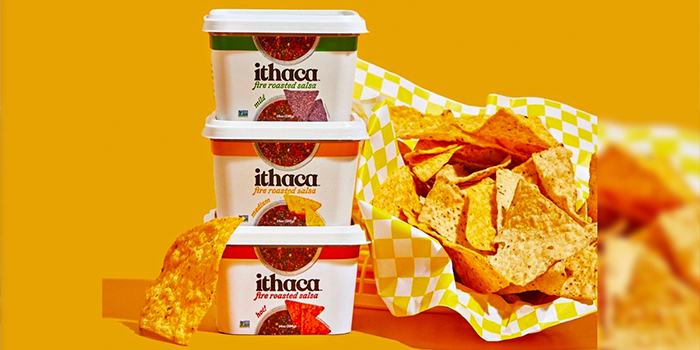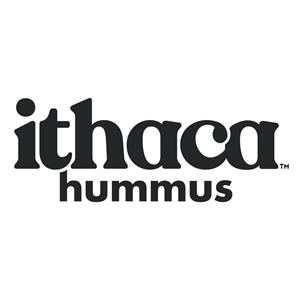Ithaca Hummus Expands Into Salsa, Plans To Uphold Chickpea-laden Identity For Now

While hummus is an inherent part of the brand’s identity, Ithaca Hummus founder and CEO Chris Kirby doesn’t believe its first line extension – Fire Roasted Salsa – will be the source of too much consumer confusion.
Ithaca has gone through phases of identity crisis, flip flopping between names nearly since its inception, joked Kirby, who explained that the company’s 2017 rebrand to Ithaca Cold-Crafted was a preemptive move made in anticipation of a future product extension beyond the chickpea-based dip; the brand returned to its original moniker shortly after.
As it now enters its “tweener years,” Kirby said he believes the dip brand has accepted that its formal identity doesn’t define what the brand is, or could become, particularly in the minds of consumers.
“I don’t know the future state of our name, but I can promise it won’t be anything more dramatic than dropping ‘hummus’ off of ‘Ithaca,’ but quite frankly, we may not ever need to do that,” Kirby said. “It’s okay to pay homage to the roots and just say we’re Ithaca Hummus and we have salsa too.”
The new salsa line comes in Mild, Medium and Hot varieties and is made with fire roasted tomatoes, and fresh onions, jalapeños, lime juice, cilantro, salt, garlic and vinegar. Packaged in a 14 oz. version of the brand’s signature square tubs, Ithaca was able to boost the fresh salsa’s shelf life from 40 to 90 days by using the same high pressure processing (HPP) method used for its hummus. The inclusion of fire roasted tomatoes allowed the product to better maintain its “flavor and integrity” across the span of its shelf life, Kirby said.
According to Kirby, the concept for a fresh, clean label salsa with the potential for national distribution was sparked after a conversation with a grocery category manager. Ithaca’s R&D team then spent the next year and a half working to develop a commercial product.
“[We thought] maybe this feels a little early to extend beyond hummus, but this is a great opportunity and a clear product-market fit that we can’t ignore,” he said.
Ithaca’s hummus products are available at retailers across the country including Wegmans, Whole Foods Markets, The Fresh Market, Publix, Stop & Shop and Shoprite. Retailing for $6.99, the new salsa is available exclusively in select Whole Foods regions through March 1, with wider distribution likely to follow.
Staying true to its roots is a key focus for the brand and an inherent part of its growth plans. While the company previously secured a $2.7 million investment from its co-packer, LiDestri Food and Drink, which counts salsa and tomato-based products as a core area of expertise, it isn’t looking to raise additional capital any time soon. Kirby said the brand has received plenty of interest from venture capitalists, private equity firms and a range of other strategic partners, but for now, he hopes to keep those offers at bay for “as long as it makes sense.”
“I’m not a fundraising entrepreneur, it’s not my thing and I’ve never liked it,” Kirby said. “I would rather be a good operator and utilize the amazing team that I’ve built to manage the business in a very nimble way. Fortunately, through 2020, 2021, 2022 and very challenging times from a supply chain perspective, we were able to do that successfully.”
Like many others grappling with rising input costs, the decade-old brand was pressured to raise prices last year for the first time in its history. As the team was determining its price increase strategy it came across a “somewhat back of the envelope” metric, said Kirby, that explained for every percent the price increases, the brand should anticipate a 1% decrease in unit velocity. Using that as its performance litmus test post-increase, raising prices on its 10 oz. hummus tubs from $4.49 to $5.49 was a success, he said.
“Take all that, which was last year, and fast forward to where we are today – in a highly inflationary environment,” said Kirby. “We weren’t the only ones that increased our price, so did like every other brand, and there’s the obvious impact of ‘what does that mean for premium brands and premium offerings out there?’ That’s yet to be seen, to a degree, but we are watching it very, very closely.”
As for future innovations, Ithaca has some “snackers” in its pipeline to launch over the next year, but otherwise the brand is not planning any major R&D roll outs. According to Kirby, the brand intends to stick with “congruent categories” where its expertise in fresh ingredients could be applied to create better-for-you iterations of popular products. According to paperwork filed with the USPTO, the company has tried to obtain numerous dip-related trademarks and currently has claim over the mark “Ithaca Guacamole Dip,” among others..
“The macro environment has really forced a lot of brands, including Ithaca, to really double down on their core and the tried and true [products] that we know work,” said Kirby. “Also it’s very expensive to launch new products, and it’s less expensive to sell more of the stuff that you already have.”

















